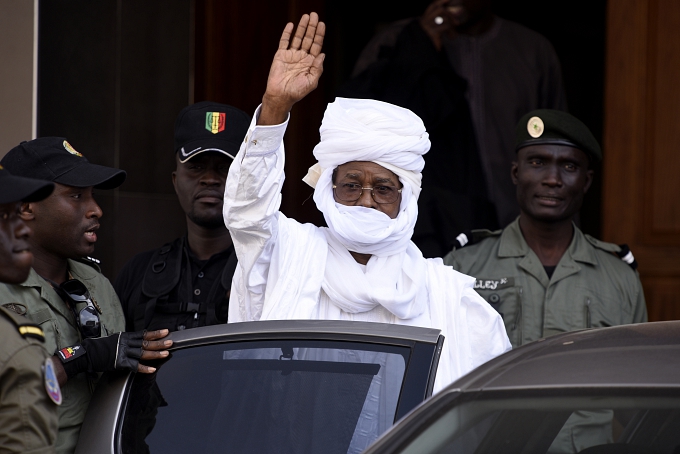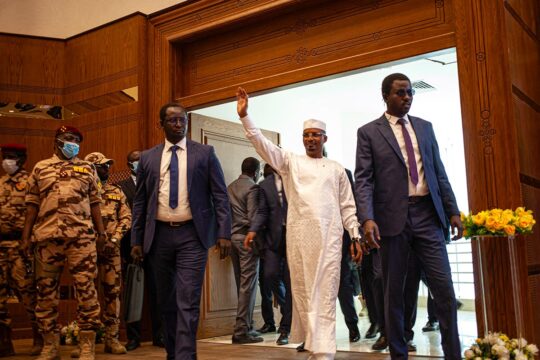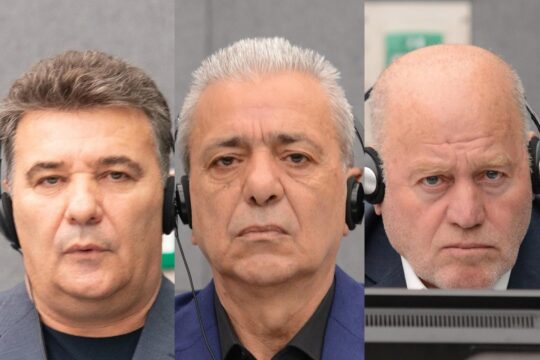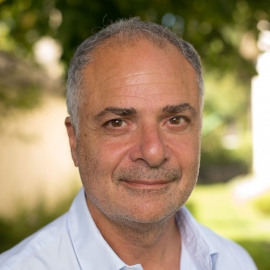What was former Chadian president Hissène Habré, seated in the Accused box in the Dakar Justice Palace, thinking about on Thursday, the last day of his trial? Was it of the nomadic shepherd child he once was in northern Chad, the student in Paris and the doctorate he obtained? Perhaps of the rebel fighter in the Tibesti desert that he then became, or the dictator who ruled his country with an iron fist from 1982 to 1990? Was he perhaps thinking about the ingratitude of the United States and France, which supported him for a long time? Or perhaps indeed about this Thursday marking the end of his four-month trial, when his three court-assigned lawyers pleaded his innocence, seeking to clear him of torture, war crimes and crimes against humanity charges? They described him as a “patriot” who had managed to preserve the territorial integrity of Chad. Without him, they argued, Chad “would have become a province of Libya”. They described him as a victim persecuted by Amnesty international and Human Rights Watch (HRW), in other words by the West that wanted to set an example, forgetting that Habré was their ally against the impetuous and dangerous Libyan leader Muammar Gaddafi. “I plead for his acquittal. His name should be written in gold letters…” said one of his court-assigned lawyers, whereas the Prosecutor had requested the previous day that Habré be jailed for life.
Was Hissène Habré listening to the defence team that the Court imposed on him? The former Chadian president remained obstinately seated when the judges entered the Chamber, marking his defiance of a Tribunal he deems illegal and illegitimate. Faced with the hundred or so witnesses that have taken the stand since September before these Extraordinary African Chambers recounting their suffering, torture, sexual abuse, summary executions, prisoners forced to dig their own graves, he has remained walled in silence as a sign of protest, the white turban half-covering his face meant as a sign of purity, wearing dark glasses as if blind to his victims and his judges. Occasionally his body could no longer stand being a sphinx, and one of his feet would start to fidget nervously.
Stars in alignment
This trial is without precedent. It is the result of victims’ determination and perseverance. More than 25 years have passed since current Chadian president Idriss Deby ousted Hissène Habré and Habré fled with the national treasury to Dakar, where he has been on trial since September. For 25 years Souleymane Guengueng, who was tortured but survived the death cells, and Clément Abaïfouta, the student who was forced to dig the graves of Habré’s victims, along with many others have been dreaming of justice. I met Souleymane Guengeng in N’Djamena more than 15 years ago. He was still amazed he had survived, “the little bird in the branches” whom Habré’s cohorts could easily have killed and who was already saying: “I want this trial not only for me and the victims but for the whole of Africa and beyond, because justice is everyone’s right.”
For this trial to take place, it needed the stars to be aligned in the right place, for the political situation to allow this quest for justice to take shape. If a Spanish judge had not charged former Chilean dictator Augusto Pinochet in 1998, the doors to justice without borders would not have opened and this trial would not have happened. It took a twist of fate in 2001 when the archives of the repression fell into the hands of HRW, describing how it was carried out under Habré and providing overwhelming evidence for the prosecution. In Senegal, it also needed President Wade – close to Habré – to lose the 2012 elections to Macky Sall for the Extraordinary African Chambers to become a reality. Of course, it also needed the determination of the Chadian victims, combined with the judicial expertise and media savvy of HRW’s Reed Brody for the first trial of a former African president on African soil to take place under the principle of universal jurisdiction. In other words, it has taken a quarter of a century for this former dictator, a “dead branch” with no more protectors, to appear before his judges.
The man who ran faster than death
So, since September, witnesses have been appearing before the Court. Robert Hissein, dubbed by his jailers “the man who runs faster than death” because he survived all their tortures, recounted his suffering and how he counted methodically the 2,053 prisoners he saw die. Bichara Dijbrine Ahmat, the only survivor from a summary execution of 148 prisoners of war in 1983, also testified. Then came testimonies of four women on sexual abuse that they endured in a military camp in northern Chad, and of insider Bamdjim Bandoum, former official of the Directorate of Documentation and Security (DDS), Habré’s political police and main instrument of repression. There were also testimonies from prison nurses who described the terrible detention conditions.
Then on Thursday it was the turn of the three court-assigned defence lawyers, to whom Habré has never spoken, to make their final arguments. They talked of “pseudo-massacres”. They tried to cast doubt on the credibility of witnesses they said had been “prepared, manipulated and coached by HRW”. They said the claim by witness Khadija Hassane Zida that she had been raped by Habré himself could not be true because “she stank so much after three months in detention” that he, who had two wives, would not have lowered himself. They accused current Chadian president Idriss Deby of having offered former DDS torturers “a pact of absolution” if they testified against Habré. Finally, they painted a picture of Habré as the saviour of his nation facing down internal revolt and the Libyan invader, and requested an unlikely acquittal.
Not everything was perfect in this unprecedented trial, in fact far from it. But despite everything, it holds more lessons than the procedural arguments marking the endless trials of the International Criminal Court (ICC). The Chadian authorities have allowed internal broadcasting of the hearings. But they have banned former DDS leaders from testifying in Senegal, despite a judicial cooperation agreement between the two countries. Did they fear testimony against President Deby, who was for a time Habré’s Chief of Staff before ousting him? There was also the choice of the Accused to order his lawyer François Serre to boycott the trial and become instead a blogger in charge of a website dedicated to praising Habré and denouncing the illegitimacy of a Court presented as a “dark political and judicial plot” against his client.
Yet none of that takes away from the feelings of Souleymane Guengueng and many other victims that the holding of this trial is a victory in itself. “I will leave Dakar with my spirit appeased,” says Souleymane. “This is a precedent for Arica and the rest of the world.”
The verdict is expected on May 30, 2016.







